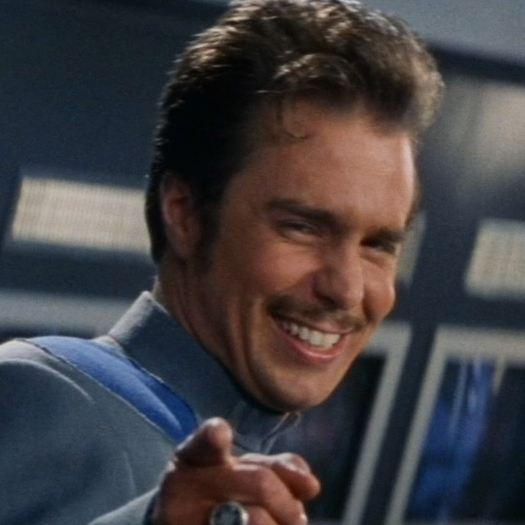In “The Wounded,” Captain Picard and the Enterprise are tasked with intercepting the USS Phoenix, commanded by Captain Benjamin Maxwell. Maxwell is destroying Cardassian ships and outposts, convinced that the Cardassians are preparing for another war.
Lets make some changes to this setup and explore a hypothetical: what if Captain Kirk is sent to intercept the Phoenix instead? How do you think Captain Kirk would have approached and handled Captain Maxwell’s actions differently compared to Captain Picard?
There are actually several ways you could construct this hypothetical so here are my suggested substitutions:
- Lets say that this is happening in the 23rd century, i.e. Captain Maxwell is the displaced captain.
- Lets say we’re talking about Paul Wesley’s Kirk, for two reasons. One, we all currently have a big crush on Paul Wesley, and two, I think there’s another interesting choice we can make here…
- Lets say that Kirk is in command of the USS Farragut and La’an is his XO. Rather than the Galaxy-Nebula showdown where the Enterprise significantly outgunned the Phoenix, Lets say that the Phoenix is Hoover-class, and lets say that the Phoenix is better armed but not as fast as the Farragut.
- Since we’re in the 23rd century lets sub in the Klingons considering the context is the same: last war just ended, everyone is touchy about starting a new one by accident.
One last bit of food for thought: how does Kirk feel about the Klingons in the early or mid 2260s? If David is alive he’s an infant, but is it possible that Kirk was already primed to hate the Klingons due to his experiences in the first Klingon war? Is Kirk more inclined to believe Maxwell because he distrusts the Klingons?
In TOS, Kirk does not hate the Klingons. I remember this episode when he and the Klingon captain must refrain from feeding hate to stop the alien of the week.
Depends on when - early on in TOS: “Errand of Mercy” he’s pretty eager to turn it into a hot war with Kor and like the latter is indignant when the Organians deny them the opportunity to do so.
My thinking is that Kirk saw action of some sort during the war and lost a lot of friends, leading to a general antipathy against the enemy as is natural, but his duty as a Starfleet officer and captain to keep the peace tempered his anger and kept it in check, which is why he was willing to work within the rules when dealing with the Klingons in “The Trouble with Tribbles” and “Friday’s Child” and “Day of the Dove”.
It was only after David’s death that he reverted to his “never trust Klingons” stance but even then his own sense of duty as a officer more or less kept him civil and professional in TUC, allowing him to see the sincere peacemaker in Gorkon and realize the extent of his own prejudices.
Is Kirk more inclined to believe Maxwell because he distrusts the Klingons?
Rather unlikely. Kirk (at least in TOS) is very much by the book, and would not be one to put his prejudices over what the law dictates, and Captain Maxwell would be breaking the law. Irrespective of his feelings, there is a due process that has not been done. Captain Maxwell’s suspicions mean nothing, besides the possibility of an investigation.
He certainly can’t go off and shoot at Klingon ships he suspects of carrying illegal weapons, not without some form of prior authorisation.
Being TOS, it’s possible that Kirk would have known Captain Maxwell in his academy days, and after an unsuccessful attempt at talking him down, it’s down to his engineers to find the prefix code to disable the Phoenix, whilst also straining the Enterprise to stay within transmission range, and maybe taking some fire from the Phoenix.
It might culminate in the Enterprise protecting the Klingon ship from weapons fire before they are able to disable the other vessel, hinting at the future possibility of peace, with it being left ambiguous whether they had weapons or not.



